7 tips for giving the best tech talks at meetups
No one likes being bored at a meetup listening to an awkward or boring talk. Check these tips & tricks for making your next meetup talk awesome, which we learned the hard way.
If you’ve had the chance to chat with the tech communities in Shanghai, Berlin, or DC, you’ve probably been to one of Wiredcraft’s meetups or can quickly find someone who has.
And you/they probably loved it, too. After organizing events over the past several months, we’ve learned the hard way that two things are absolutely critical to a successful meetup: organization (see how we do it) and good speakers.
So why is a digital product agency organizing meetups, you ask?
In early 2014, some JavaScript developers got together to host the first Shanghai JavaScript Meetup. After a few meetups, the main organizers found that they didn’t have time, so our now down-under developer Xu Feng began organizing the meetup himself. Xu Feng spent a lot of time preparing topics himself and would host the meetups in Wiredcraft’s Shanghai office.
The first JS meetup I attended was in August last year. We had 35 people cramped into our tiny presentation space and, with the excitement and passion for JavaScript, we saw an opportunity for the community.
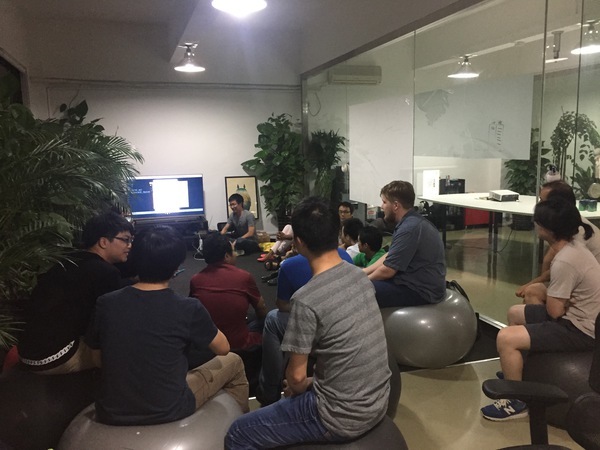
That’s when I jumped in to help Xu Feng. I took over planning out the details, finding the location, finding good speakers (with the help of developers of course), promoting the event, and all of the organizational things that make hosting good events tough and that left the developers time to do what they do best: develop.
We didn’t change the content, only helped to professionalize the event and streamline the planning. People know what to expect when they come to our meetups: free pizza and drinks at the beginning, check-in, name tags, high quality speakers, the chance for them to share their projects at lightning talks, and a job opportunity section.
By the Community, For the Community
The event gave the opportunity for experienced community members to share their expertise, their adventures with new frameworks/concepts, cool projects, and, more generally, their experiences and inspirations.
New community members can grow their network, learn from advanced community members, and get help with problems. The companies present have a chance to give back to the community by sponsoring the venue or food and drinks, and to share their HR opportunities.
JavaScript, Hacker News, UI/UX, Docker…
Our employees really enjoyed attending the meetups and getting to know other people in their community, and we saw how a lot of the meetups in Shanghai would host one event and then sputter out. We knew we could consistently host great events for people to attend so we asked our employees what events they would like to attend, and the meetup madness began.
We started hosting an Ansible meetup in August, which went through many different versions to fit the community, and has been reborn as the DevOps Meetup.
After reaching out the Shanghai design community and speaking with potential speakers and venues, we kicked off the UI/UX Designers Meetup, which is now the largest monthly tech event in Shanghai. To celebrate a year of organizing awesome design meetups, we’ll be hosting a UI/UX Conference in Shanghai in October later this year.
We also revived the Hacker News Meetup to create a place for techies, entrepreneurs, and designers to get to know each other without the fluff and formality of your typical networking events. We host this event in Shanghai, Berlin and DC.
Last, but definitely not least, we’re launching Shanghai’s first ever Docker Meetup.
After months of ironing out the kinks, our biggest problem now seems to be finding venues large enough to hold everyone attending our meetups.
So what does Wiredcraft get out of hosting meetups?
- Our team members grow their networks. Good for us as a company, good for the team members individually.
- People get to know our brand. It’s a courtship: the more of our events people come to, the more curious they become about what we do.
- Recruitment opportunities: some of our newest recruits we got to know through meetups as they were presenters, or spoke with our team members at the events.
- Share our company culture and support our community. People have learned that we care about quality and the community just by attending our events.
But organizing meetups isn’t a cake walk…
The key to success with meetups is consistency, professionalism, and good speakers.
People are here in their free time. You have to show a level of respect. No one wants to sit down and hear your sales pitch. They want something actionable, they want to feel inspired. It’s important in all aspects of the meetup to put the community first. Be willing to take feedback and adapt.
The organizing part for our meetups became pretty painless once we ironed out some good processes like speaker referrals, scheduling, and sponsorship, but finding good speakers is a persistent obstacle.
It’s a challenge for a host of reasons: finding fresh topics, new and interested folks, and people with a knack for speaking (which many people don’t even realize they have).
After talking with several community members about speaking opportunities at our meetups and we hear countless reasons why they’re missing out on the opportunity:
“I have nothing interesting to talk about,”
“I’ve never spoken before.”
“I’m not very good at speaking in front of people.”
…and so many more.
After hearing over 30 speakers in the last 3 months - some exceptional, some great, and some committing the worst cardinal sins of presenting - I reached out to the best I’ve seen for some advice on how to have a successful tech talk to help tip the scales for a few of your community members towards givinv=g speaking a try.
Reason 1: I don’t know what to talk about; I have nothing interesting to say
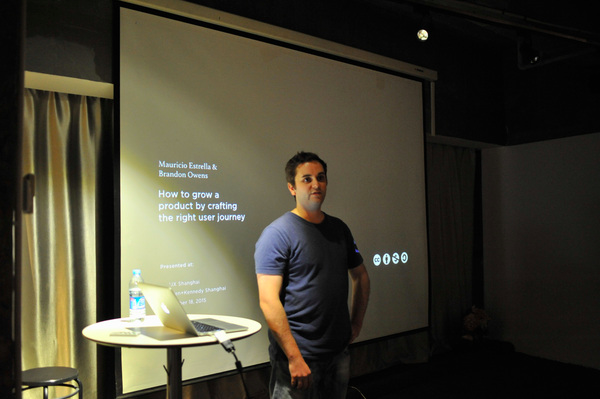
“Create value first; teach your audience something relevant by tailoring your presentation to what they care about, not what you care about.” - Brandon Owens
Find something you’re comfortable talking about, no matter how simple it is. I once watched a TED talk on tying shoes and I actually learned something from it! Brainstorm with your friends, your team, ask on Quora/Reddit - there are tons of sources of feedback for your tech topics. Unless this is a first-time event, you should also have access to previous presentation slides, videos, and the organizer feedback questionnaires.
Once you have your idea(s), it’s a great time to reach out to the meetup community/event organizers or do some research. Look through the meetup attendee list, select a few attendees, and DM them on Meetup with your ideas and see what they would be interested in.
Reason 2: I wouldn’t know where to start.
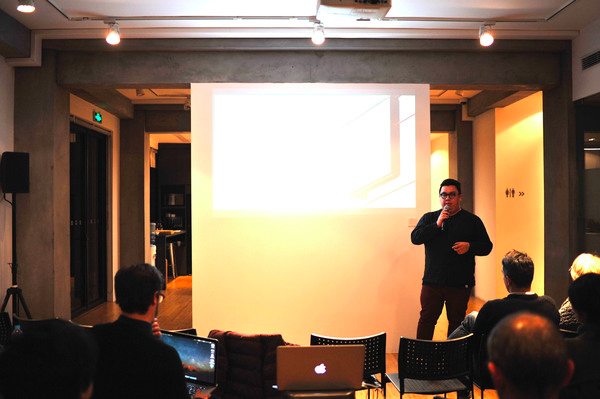
“Every good talk needs a strong storyline. Frameworks for storytelling can guide you, such as ‘Context > Conflict > Resolution > Complication > Actual Resolution’. By using a more defined narrative on your talk, people’s attention and engagement will follow a more natural rhythm during your delivery. However, my ultimate trick is to take improv classes. Do it. It teaches you things that you can’t possibly learn in any other way. I never rehearse for my talks, but I do use a lot of improv lessons to guide me before/during my talk.” - Mauricio Estrella
Tell a story. It’s great that you know how to do things, but people are interested in, well, people. Mauricio gave some great tips on how to structure your presentation and how to make sure you execute successfully, so give his model some consideration.
And if you’re interested in trying your hand at improv, I recommend pursuing lessons in your local community or, if you’re really wanting to dive in and willing to travel, you can enroll in top-notch improv training, such as Upright Citizens Brigade or Second City in the U.S. or if you’re in Shanghai you can check out ZMACK.
Reason 3: I’ve never presented before.
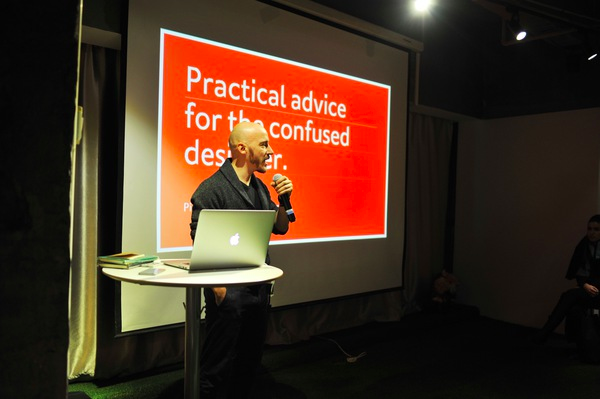
“Unless you have an innate talent for improvisation, you’d better write it and rehearse. It doesn’t have to be a prose. What you will say will not be the same anyway. Allow flexibility, list only key-ideas; they will be your anchors during the talk.” - Pierrick Calvez
Practice makes perfect. It’s may be a tired proverb your high school soccer (see: football) coach constantly hammered into your head, but it works for pretty much any aspect of your life.
There are tons of resources for public speaking. They’re endless, from online or local classes to YouTube videos and guidebooks, covering subjects from posture to dictation speed to hand gestures, you name it. Just remember not to take yourself too seriously, lest you stress way too much and sap all the fun out of it. Practice with your friends, colleagues, or even your event organizers and you’ll nail your presentation. I suggest this list of tips from top TED presenters or one of our neighbors in DC, public speaking expert Allison Shapira.
Reason 4: I’m afraid of making a fool of myself
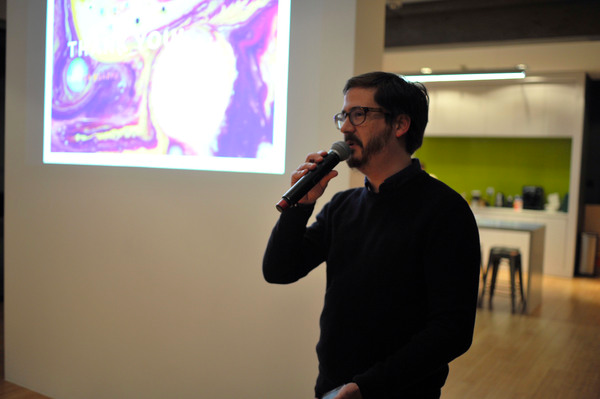
“I guess the worst thing to do during a presentation is to read a script. It’s impossible to look your audience in the eye and read a script at the same time. I allow myself a small cardboard, or phone with a rough plan of my presentation.” - Gabriel Jorby
I asked our esteemed speakers for tips on what they said is the biggest “no-no” you could do during a presentation. The responses mainly focused on your delivery and presentation format.
Don’t let yourself get bogged down in words and text, on your slides or in your talk. Keep your pace and voice engaging. Practicing will help make this part of your talk, and you won’t need to rely on a script in real-time.
Reason 5: What if my talk starts to go bad? How can I turn it around?
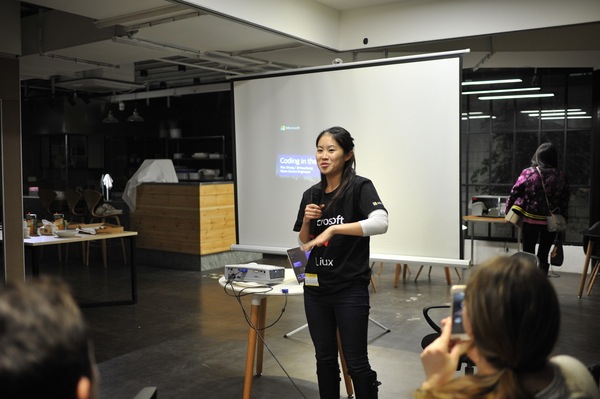
“When it was obvious people didn’t know any of the tools/technologies I was presenting. I turned the talk around by asking questions and adjusting the talk to more high-level and start from the very basics.” - Rita Zhang
Pay attention to your audience and check for eye contact and nonverbal feedback, looking for signs of how engaged they are or aren’t. If you read your audience and try to interact with them appropriately, even if your original plan isn’t the perfect fit, everyone involved will have a better return on investment and overall experience.
Reason 6: What to do when it’s over?
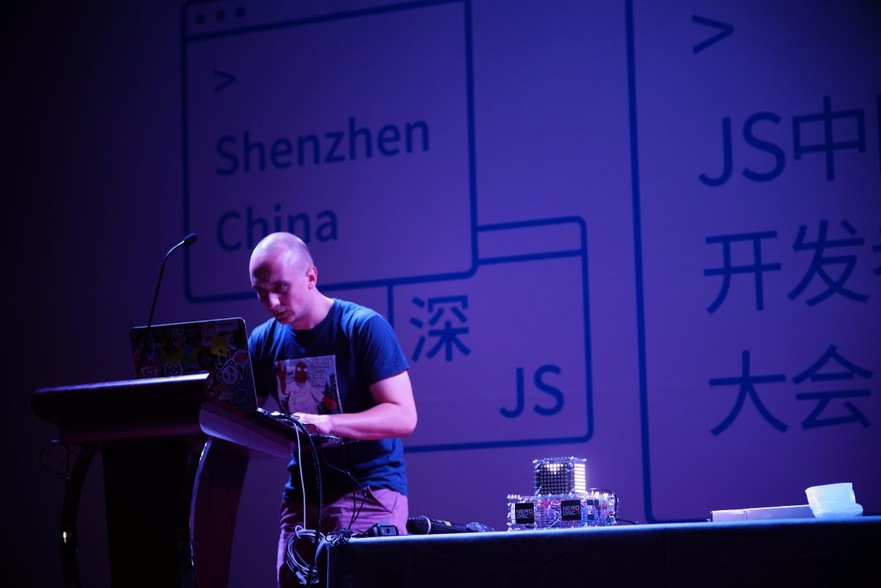
“Trial & error. I use every talk to see what works with the audience and what doesn’t, which also means I never give the same talk twice. Feedback is super important. I also watch talks from other people to be inspired.” - Tim Pietrusky
So what if your talk wasn’t perfect? Take notes on yourself and learn what you can do better next time. Maybe everything went as awesome as possible? Great! Identify the best parts of your presentation to make your next one even better and work on your areas of improvement as well.
Have flexibility, get feedback from your audience, adapt, and keep presenting. The worst things you can do are stop and get nervous or be too arrogant. Get the Meetup bug and reach out to your community, keep practicing, get feedback, and get better.
Reason 7: I don’t have time
If you’re an organizer, you can always be proactive and provide support to your community, especially by providing them tools for becoming a great speaker. By making things streamlined and providing support, even the busiest people can make time to be a speaker at your event.
Do you have any questions on how we run our events? Do you run a great event yourself and have advice to share? Do you have any great speaking advice? Tweet at us or send us an email.
Be sure to check out some of our meetup groups while you’re out there clicking through the internet:
Shanghai Hacker News
Berlin Hacker News
Shanghai UI/UX Designers
Finally, a parting gift: you can download a PDF of the full, unabridged advice from our beloved speakers.
You’ll find also everything you need to know on our events page.